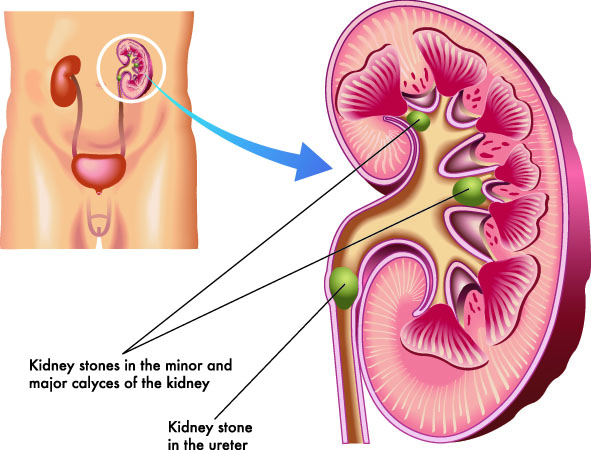How to Distinguish Between Kidney Stones vs UTI: Secret Variables and Analysis Tips
How to Distinguish Between Kidney Stones vs UTI: Secret Variables and Analysis Tips
Blog Article
Discovering the Manifestations and Causes of Kidney Stones in Contrast to Urinary System Infections: A Detailed Guide
The exploration of kidney stones and urinary tract infections (UTIs) exposes a complicated interaction of signs and symptoms and underlying reasons that necessitate mindful examination. What are the key differences in their symptoms, and how might these notify treatment methods?
Introduction of Kidney Stones
Kidney stones, likewise understood as renal calculi, type when certain substances in the urine crystallize and aggregate, leading to the development of hard down payments within the kidneys. These rocks can vary in size, ranging from a grain of sand to a golf ball, and can be made up of numerous products, the most typical being calcium oxalate, uric acid, struvite, and cystine. The formation of kidney stones is affected by numerous variables, consisting of dietary practices, fluid consumption, and hereditary tendency.
Symptoms of kidney rocks might include serious pain in the back or side, blood in the urine, nausea or vomiting, and regular urination, specifically as the rock moves via the urinary system tract. Medical diagnosis commonly entails imaging research studies such as ultrasound or CT scans, alongside urinalysis to recognize the stone's composition.
Therapy choices vary based upon the dimension and kind of rock, in addition to the seriousness of signs and symptoms (Kidney Stones vs UTI). Little stones might pass naturally with increased liquid intake, while larger rocks may call for medical interventions such as lithotripsy or medical removal. Recognizing the pathophysiology and risk variables connected with kidney stones is essential for reliable prevention and monitoring
Summary of Urinary System Tract Infections
Urinary system tract infections (UTIs) are typical bacterial infections that impact any part of the urinary system, including the kidneys, ureters, bladder, and urethra. They mostly happen when microorganisms, typically from the gastrointestinal tract, get in the urinary system, resulting in swelling and infection. UTIs are classified into 2 major types: straightforward and challenging. Straightforward UTIs typically happen in healthy and balanced people with normal urinary systems, while complicated UTIs may emerge in individuals with underlying conditions, such as architectural abnormalities or compromised immune systems.
The frequency of UTIs is notably higher in ladies than males, largely due to anatomical differences, such as a shorter urethra. Risk aspects consist of sex-related task, specific contraceptive approaches, urinary system retention, and dehydration. The medical diagnosis of UTIs is generally confirmed through urine tests, which may reveal the presence of microorganisms, leukocyte, or red cell.

Signs And Symptoms of Kidney Stones
The pain connected with kidney stones can manifest in numerous methods, commonly leading individuals to seek medical interest. One of one of the most usual signs is severe discomfort, commonly local in the lower back or side, which might emit to the abdomen or groin. This discomfort, often referred to as sharp or cramping, can take place unexpectedly and may rise and fall in strength.
Additionally, people might experience hematuria, or blood in the urine, which can vary from microscopic quantities to noticeable discoloration. This signs and symptom might be accompanied by adjustments in urinary habits, such as boosted frequency or necessity, in addition to pain throughout peeing. Queasiness and throwing up are likewise prevalent, commonly resulting from the body's response to intense discomfort.
In many cases, individuals might experience high temperature and chills, specifically learn the facts here now if a secondary infection establishes as a result of the obstruction triggered by the rocks. Overall, the combination of extreme discomfort, hematuria, altered urinary patterns, and stomach signs can give significant insight right into the visibility of kidney rocks, requiring timely clinical analysis and intervention. Understanding these signs is vital for prompt diagnosis and effective administration of the problem.
Symptoms of Urinary Tract Infections
Infections within the urinary system tract usually present a variety of unique signs that can dramatically influence daily life. One of the most common signs and symptoms include a persistent urge to urinate, frequently gone along with by a burning feeling during urination, referred to as dysuria. Individuals may also experience increased frequency of urination, generating tiny quantities of pee each time.
Various other significant signs include fetid or over cast pee, which may indicate the presence of microorganisms or pus. In some instances, pee may appear red or pink as a result of the existence of blood, a condition called hematuria. Furthermore, individuals may experience pelvic pain or stress, which can even more intensify the sensation of necessity.
Systemic signs may additionally materialize, such as fever, cools, and exhaustion, specifically if the infection has actually ascended to the kidneys. It is necessary to identify these signs early, as without treatment urinary system infections can result in more extreme issues. Kidney Stones vs UTI. Prompt clinical interest is recommended when these symptoms are observed, permitting proper diagnostic analysis and treatment to alleviate pain and prevent more health concerns
Reasons For Each Problem
Frequently, kidney rocks and urinary system tract infections develop from distinct yet occasionally overlapping causes that can impact individuals in a different way. Kidney stones normally form because of metabolic factors, dietary selections, and genetic proneness. Boosted degrees of calcium, oxalate, or uric acid in the urine can cause rock formation. Dehydration, inadequate liquid intake, and high-sodium diet plans can aggravate these conditions, promoting formation within the urinary tract.

Recognizing these distinctive reasons is vital for avoidance and treatment. Kidney Stones vs UTI. While lifestyle adjustments may mitigate the threat of kidney rocks, proper hygiene and prompt therapy of urinary system tract infections are essential for reducing their reappearance and connected problems
Conclusion
In recap, kidney stones and urinary system tract infections existing distinct signs and underlying reasons. Kidney rocks are characterized by severe pain and metabolic variables, while urinary system tract infections largely entail microbial infections leading to urinary system urgency and pain.
The expedition of kidney stones and urinary system system infections (UTIs) exposes an intricate interplay of signs and underlying reasons that warrant cautious exam.Urinary tract infections (UTIs) are usual microbial infections that affect any type of component of the urinary system, consisting of the kidneys, ureters, bladder, and urethra.Frequently, kidney stones and urinary system infections emerge from distinct yet in some cases overlapping reasons that can influence individuals in a different way.In recap, kidney rocks and urinary system system infections existing distinct symptoms and underlying causes. Kidney stones are defined by extreme pain and metabolic elements, while urinary tract infections mostly entail microbial infections leading to urinary system necessity and discomfort.
Report this page